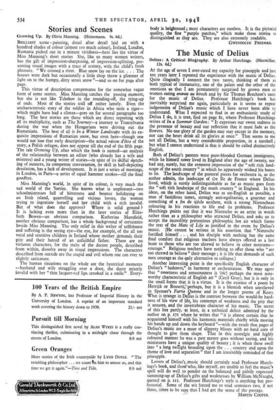The Music of Delius
AT the age of seven I over-rated my capacity for pineapple and just ten years later I repeated the experience with the music of Delius.
Quite illogically I connect the two tastes, thinking of them as
both typical of immaturity, one of the palate and the other of the emotions so that I am permanently surprised by grown men or women eating ananas au kirsch and by Sir Thomas Beecham's taste
for the music of Delius. Professor Hutchings's book has inevitably surprised me again, particularly as it seems to repeat judgements of Delius's music which I have never been able to understand. What I expected to find in an enthusiastic study of Delius I do, it is true, find on page 81, where Professor Hutchings
writes of In a Summer Garden: "It expresses our sweet sadness in
the presence of beauty and our reflection that it must fade as the flowers. No one glory of the garden may stay except in the memory,
nor can the heart drink all its glories at once." That seems to me not all Delius, but a very considerable proportion, in a nutshell ; but what I cannot understand is that it should be called distinctively English. .
Both of Delius's parents were pure-blooded German immigrants, while he himself never lived in England after the age of twenty, nor had any, surely, but the remotest impression of the "soft rich land- scape of the south country" in which he apparently wished his bones to lie. The landscape of the pastoral pieces for orchestra is, as the
author admits, the landscape of 1.1-!e Ile de France where Delius
lived, which is surely indistinguishable as far as music goes from the "soft rich landscape of the south country " in England. In his
ideas, on the other hand, Delius was as un-English as possible, a man of fastidious tastes, strongly anti-egalitarian, a gourmet and something of a fin de siècle aesthete, with a strong Nietzschean colouring in his reactions to life and its problems. Professor
Hutchings points out that it was Nietzsche as an artist in words rather than as a philosopher who attracted Delius, and asks us to accept the incredibly pretentious philosophic hot air which forms
the text of the Mass of Life as justified in the event by Delius's music. (He cannot be serious in his assertion that "Nietzsche
fortified himself . . . and his disciple with nothing but the same
final comfort that religious teachers have always offered as a last bone to those who are too shrewd to believe in other nostrums—
courage." Religious teachers have nothing to offer those who "are too shrewd to believe" their message ; it is life that demands of such men courage as the only alternative to collapse.) Another interesting point is the specifically English character of Delius's "lushness," in harmony or orchestration. We may agree
that "sweetness and sensuousness is (sic) perhaps the most note-
worthy characteristic of English art" (Cecil Gray), but it is only in the small forms that it is a virtue. It is the essence of a poem by Herrick or Rossetti,' perhaps, but it is a blemish when unrelieved
in Spenser's Faerie Queene and in the longer poems of Keats. What is strange in Deilus is the contrast between the would-be hard-
ness of his view of life, his contempt of weakness and the pity that it arouses, and the invertebrate character of his music. The secret of this lies partly, -at least, in a technical defect admitted by the author on p. 171 where he writes that "it is almost certain that he acquainted himself with his harmonic materials chiefly while moving his hands up and down the keyboard "—with the result that pages of Delius's music are a maze of slippery blisses with no hard core of thought to give them shape. That in this nostalgic and highly coloured manner he was a past master goes without saying, and his miniatures have a unique quality of beauty ; it is when these swell into "a long twilight brooding upon the . . . country and upon the theme of love and separation" that I am irresistibly reminded of that pineapple.
Lovers of Delius's(music should certainly read Professor Hutch- ings's book, and those who, like myself, are unable to feel the music's
spell will do well to ponder on the balanced and pithily expressed summing-up of Delius's gifts and weaknesses by William McNaught, quoted on p. iii. Professor Hutchings's style is .anything but pro- fessorial. Some of the wit forced me to read sentences two, if not three, times to be sure that I had got the sense of the passage.
MARTIN COOPER.






























 Previous page
Previous page